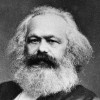“ When a panic exists a man does not ask himself what he can get for his bank-notes, or whether he shall lose one or two per cent by selling his exchequer bills, or three per cent. If he is under the influence of alarm he does not care for the profit or loss, but makes himself safe and allows the rest of the world to do as they please. ”
Karl Marx, Das Kapital (1894). copy citation
| Author | Karl Marx |
|---|---|
| Source | Das Kapital |
| Topic | loss panic |
| Date | 1894 |
| Language | English |
| Reference | |
| Note | |
| Weblink | https://www.marxists.org/archive/marx/works/download/pdf/Capital-Volume-... |
Context
“How a general sauve qui peut develops at the height of a crisis is revealed in the same report by a first-rate expert, the esteemed crafty Quaker, Samuel Gurney, of Overend, Gurney and Co.:
"1262 ... When a panic exists a man does not ask himself what he can get for his bank-notes, or whether he shall lose one or two per cent by selling his exchequer bills, or three per cent. If he is under the influence of alarm he does not care for the profit or loss, but makes himself safe and allows the rest of the world to do as they please."
V. Concerning the mutual satiation of the two markets Mr. Alexander, a merchant in the East India trade, testifies before the Committee of the, Lower House on the Bank Act of 1857 (quoted as B.C. 1857)”
source


